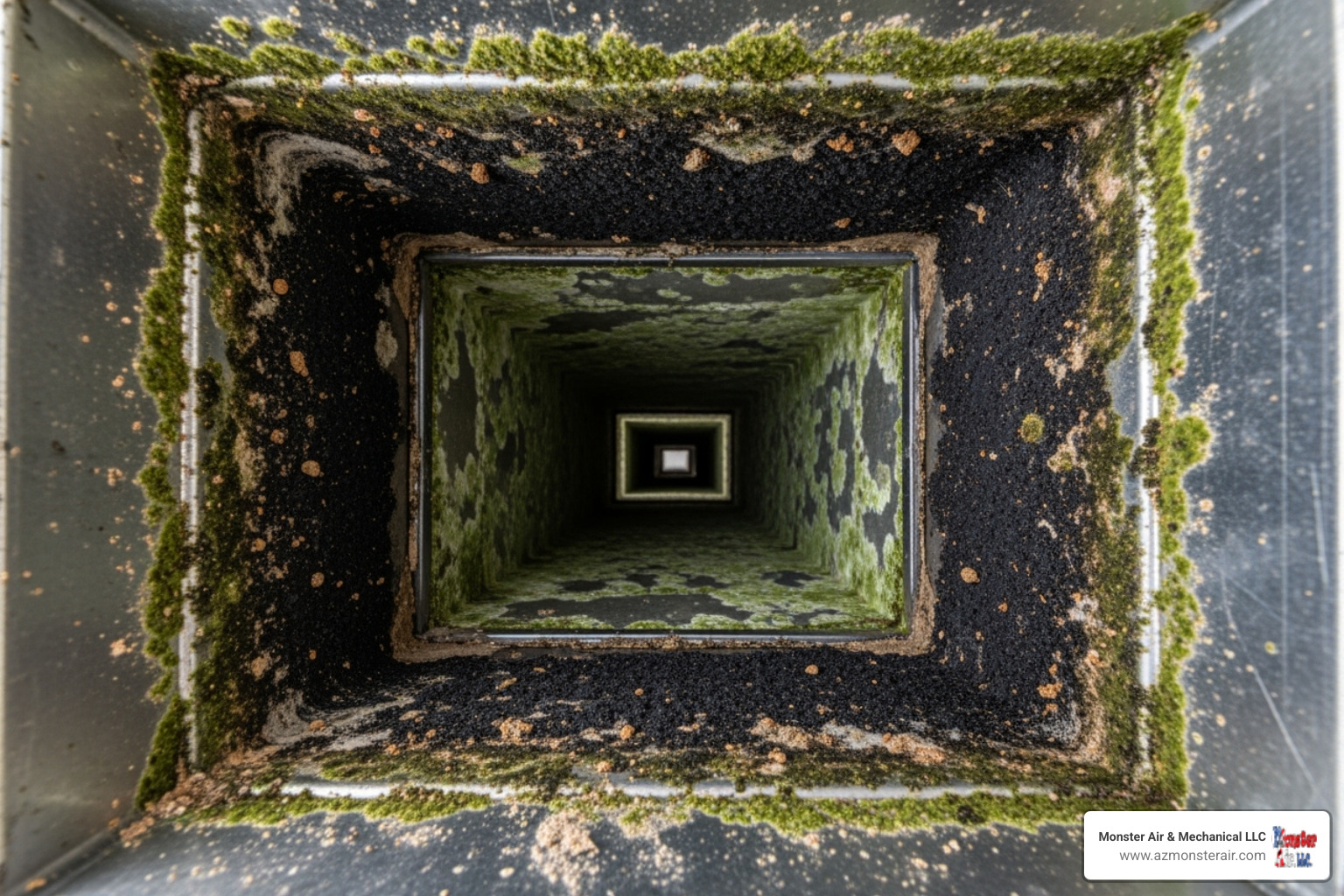Why Your Ducted Air Conditioner Filter Deserves Your Attention
A ducted air conditioner filter is the unsung hero of your HVAC system, trapping dust and allergens before they circulate through your home or clog your equipment. Regular cleaning or replacement is crucial for clean air, system efficiency, and lower energy bills.
Quick Guide to Cleaning Your Ducted Air Conditioner Filter:
- Turn off the system at the thermostat and breaker.
- Locate the filter behind the return air grille.
- Remove the filter, noting its orientation.
- Washable filters: Rinse gently with water and let dry completely.
- Disposable filters: Replace with a new one of the same size and MERV rating.
- Reinstall with the airflow arrow pointing toward the air handler.
- Turn the system back on and set a reminder for the next check.
This simple task matters. The EPA notes indoor air can be two to five times more polluted than outdoor air, making your filter the first line of defense. Neglecting it causes dust buildup, reduces airflow, and forces your system to work harder, increasing energy bills by 5-15% according to the Department of Energy. You also end up breathing recirculated dust and allergens.
Fortunately, cleaning or replacing a ducted air conditioner filter takes less than 10 minutes. Most homes need a filter check every 30-60 days, or monthly for homes with pets or allergies. If you see dust, feel weak airflow, or notice poor cooling, your filter needs attention.
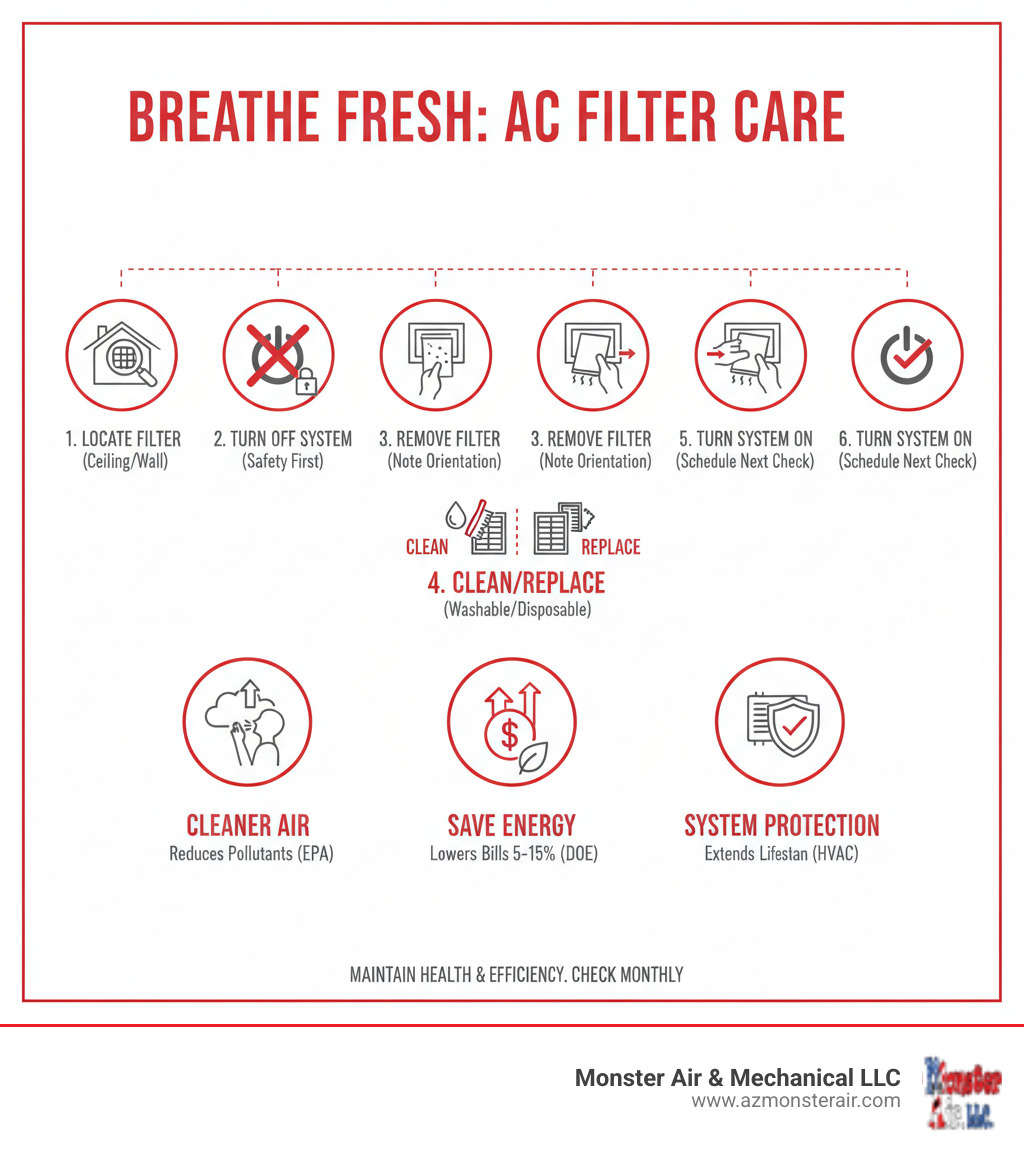
Why a Clean Filter is Your System's Best Friend
Your ducted air conditioner filter is the guardian of your HVAC system and your home's air. It traps dust, pollen, pet dander, and other allergens, preventing them from circulating in your living space or damaging your equipment.
Considering The EPA reports that indoor air can be 2-5 times more polluted than outdoor air, a clean filter is your first line of defense. It not only improves health and comfort but also protects sensitive components like the evaporator coil and fan motor, ensuring your system runs efficiently. For a comprehensive approach to a healthy home environment, filter maintenance should be combined with professional Indoor Air Quality Services.
The Consequences of a Clogged Filter
When your filter is clogged, your HVAC system struggles to push air through the blockage. This leads to serious consequences:
- Reduced Airflow and Comfort: A dirty filter restricts conditioned air from reaching your rooms, causing weak airflow from vents and uneven temperatures.
- Increased Energy Bills: The system works harder to compensate, consuming more electricity. Replacing a dirty filter can improve efficiency by 5-15% according to the Department of Energy.
- System Strain and Damage: The constant strain wears out the fan motor and other components. Restricted airflow can also cause the evaporator coil to freeze, leading to ice buildup, refrigerant leaks, or even compressor failure.
- Poor Air Quality: A full filter can't trap new particles and may even release trapped contaminants back into your air, worsening allergies and respiratory issues.
- Shortened Equipment Lifespan: The combined stress and damage can significantly reduce your HVAC system's lifespan, leading to premature and costly replacement.
Signs Your Ducted Air Conditioner Filter Needs Attention
Your home will give you warning signs when your ducted air conditioner filter needs attention. Recognizing them early can prevent bigger problems.
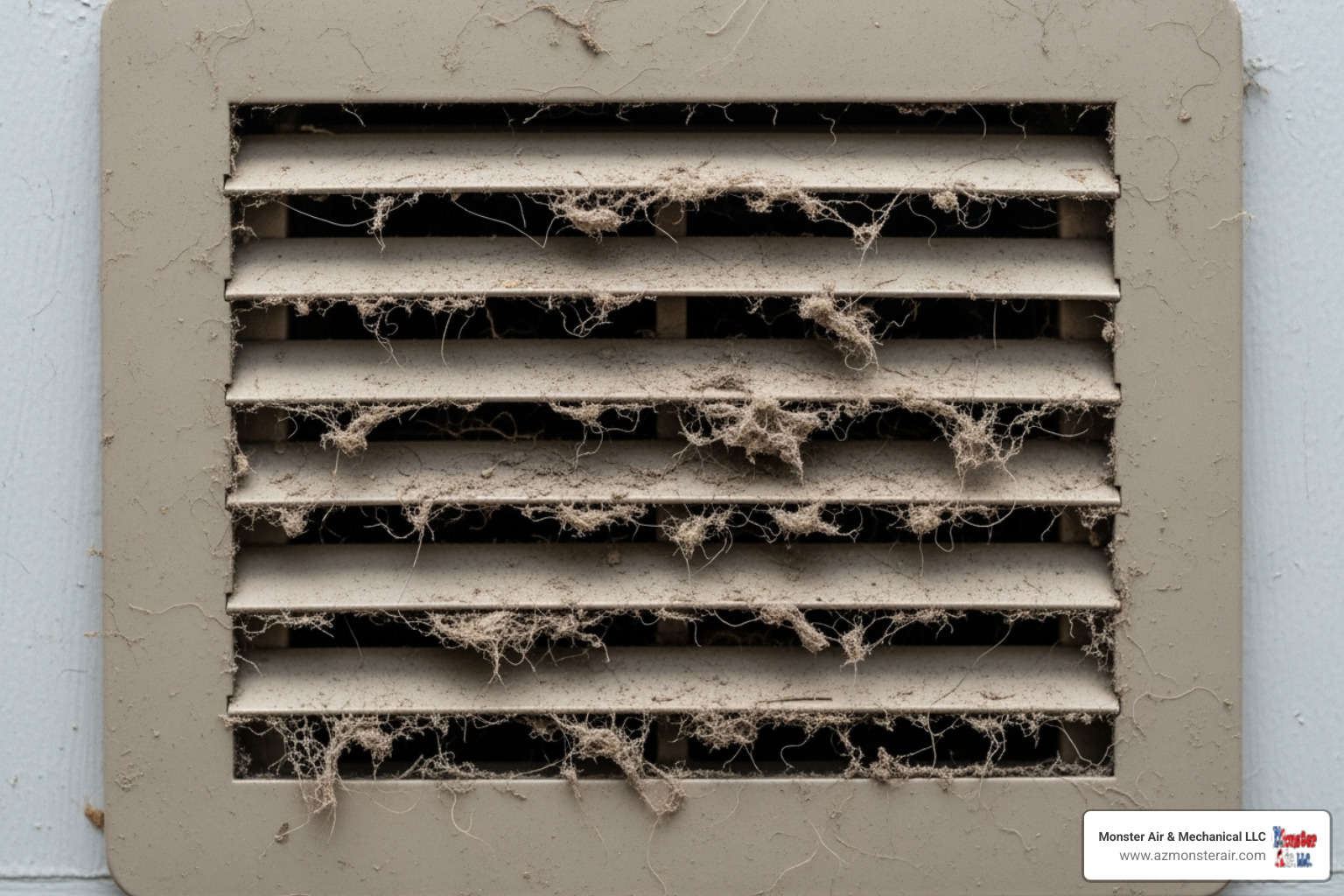
Look out for these clues:
- Visible Dust Buildup: The most obvious sign. If the filter is coated in dust, pet hair, or debris, it's time for a change.
- Reduced Cooling Performance: Your home doesn't get as cool as it should, or you feel weak airflow from the vents.
- Increased Energy Bills: A sudden, unexplained spike in your utility bills can point to a clogged filter forcing your system to work overtime.
- Unusual Noises: A strained fan motor may produce humming, whistling, or rattling sounds.
- Musty Odors: A dirty, damp filter can grow mold or mildew, creating a stale smell when the AC turns on.
- Increased Household Dust: If you're dusting more often, it could mean your filter is too full to trap new particles.
Step-by-Step Guide: How to Clean Your Ducted Air Conditioner Filter
Maintaining your ducted air conditioner filter is a quick and satisfying task. Before you begin, prioritize safety.
Always turn off the power to your HVAC system. Switch the thermostat to "off" and turn off the corresponding breaker at your electrical panel to prevent accidental startup and electrical hazards.
You'll only need a few simple tools: a vacuum with a brush attachment for quick cleanups, a garden hose and mild dish soap for washable filters, and a new filter if you're doing a replacement. If you're ever unsure, our team is ready to help with our HVAC Services.
Locating Your Filter
To clean or replace your ducted air conditioner filter, you first need to find it. There are two common locations.
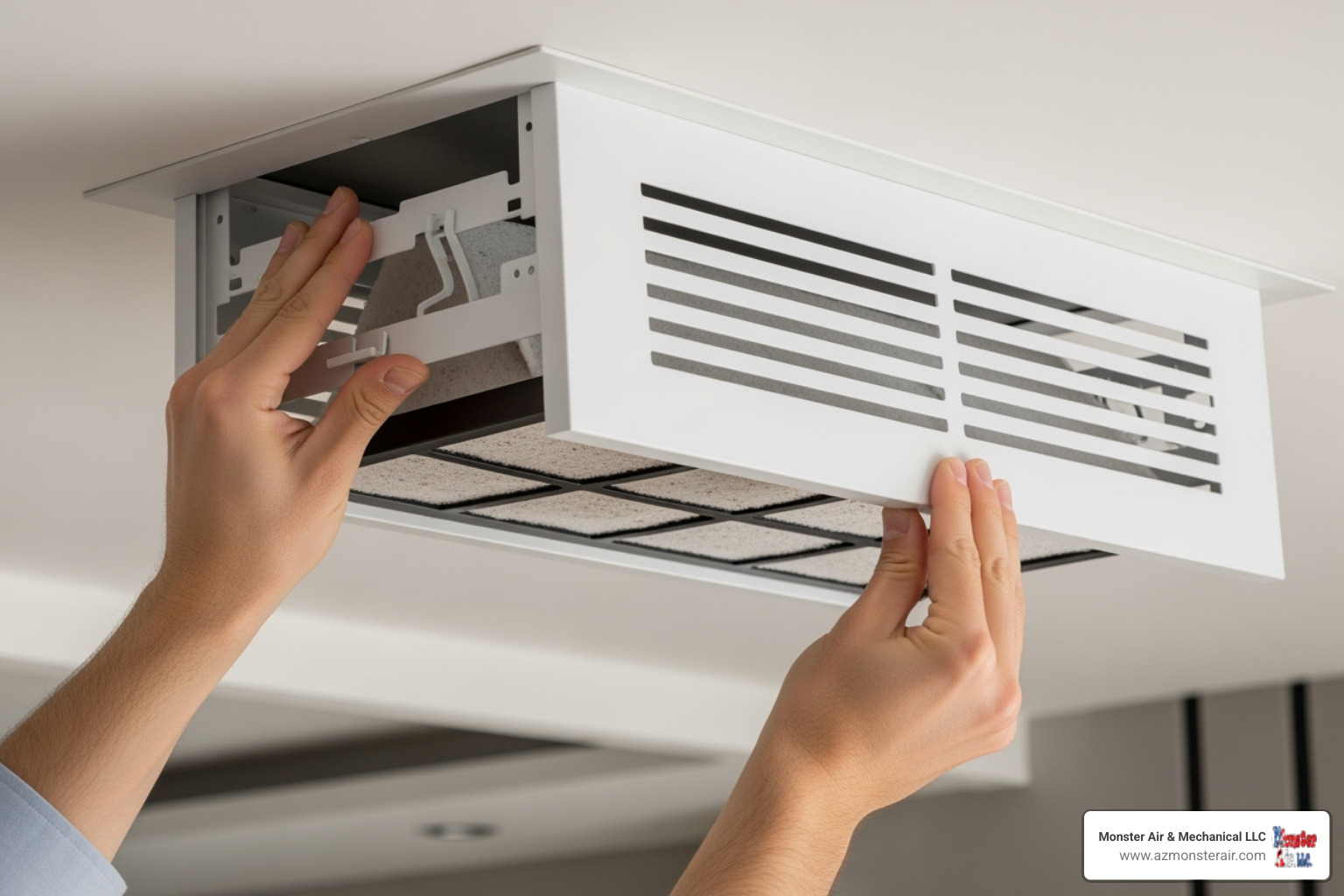
- Behind the return air grille: Most filters are located here. Look for a large vent in a central hallway, wall, or ceiling. Open the grille using the latches or screws to access the filter slot. Note the airflow arrows on the filter's frame for correct reinstallation.
- Inside the air handler unit: Less commonly, the filter may be in a slot on the air handler itself—the large metal unit in your attic, closet, or garage.
Once located, gently slide the filter out to avoid spreading dust.
Cleaning a Washable Filter
Washable filters are a reusable, eco-friendly option. Follow these steps to clean your washable ducted air conditioner filter:
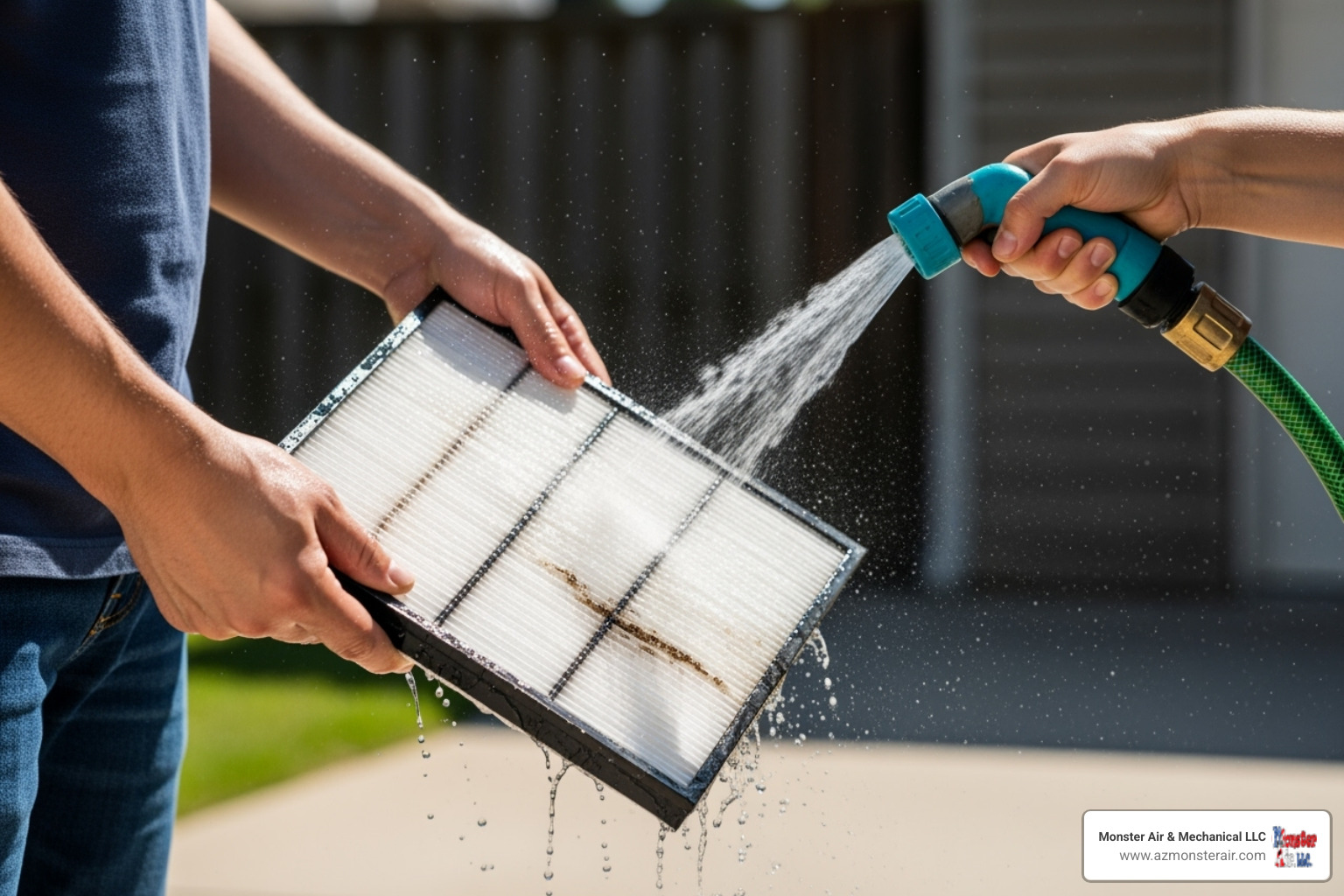
- Take the filter outside to avoid a mess.
- Rinse with a garden hose on a gentle setting. Spray from the clean side (the side facing the air handler) to push debris out, not in.
- For heavy grime, use a soft brush and a solution of mild dish soap and water. Rinse thoroughly until the water runs clear.
- Let it dry completely. This is critical. A damp filter can promote mold growth in your system. Prop it up in a well-ventilated area until it is bone-dry.
- Reinstall the filter, ensuring the airflow arrow points toward the air handler.
Washable filters wear out over time. Plan to replace yours after a year or two of use.
Replacing a Disposable Filter
Disposable filters are a convenient, single-use option. Here’s how to replace one:
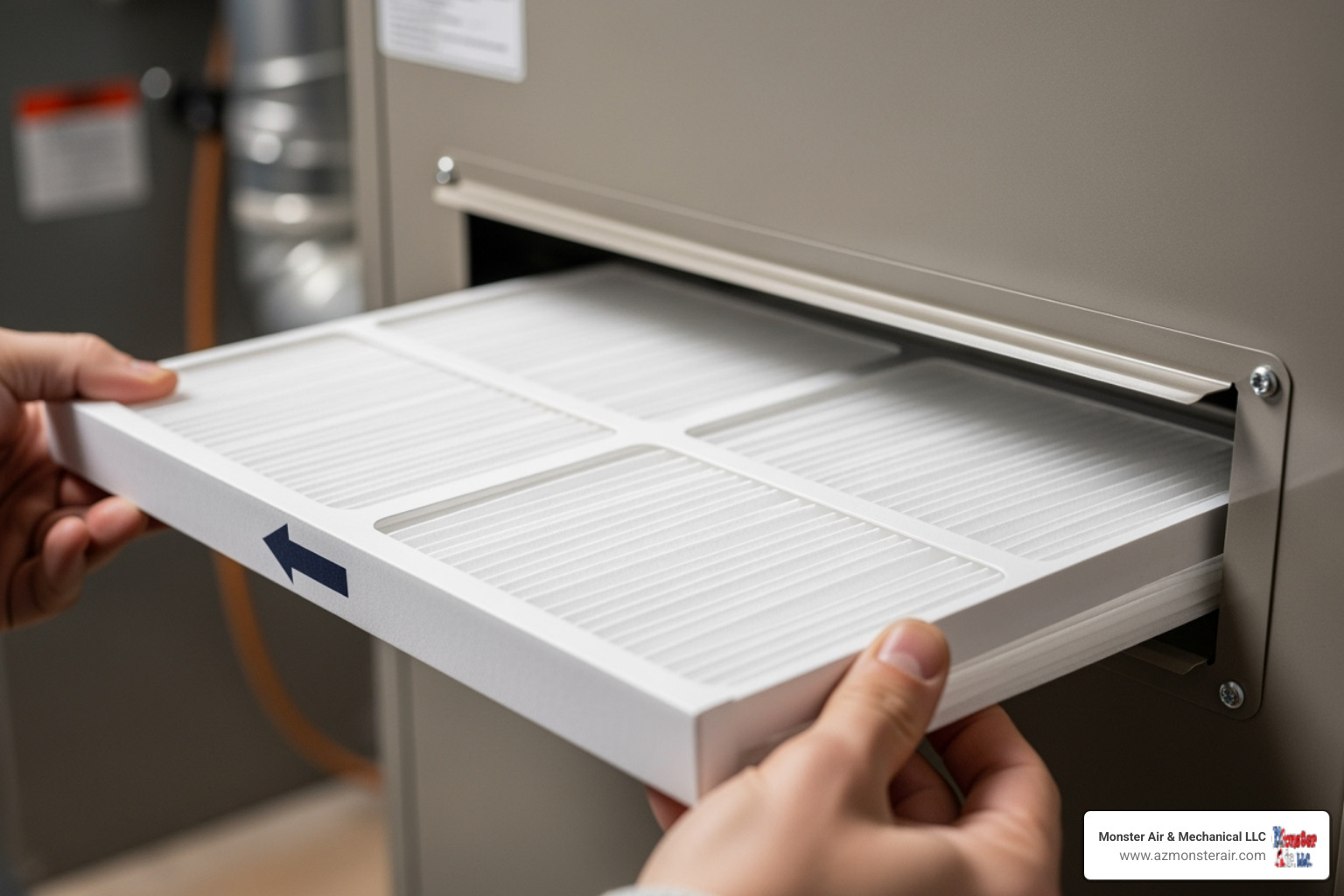
- Check the size and MERV rating on the old filter's frame before discarding it. You must use a replacement of the exact same size to prevent air gaps.
- Carefully remove the old filter and dispose of it.
- Orient the new filter correctly. Find the airflow arrows on the frame and make sure they point toward the air handler.
- Slide the new ducted air conditioner filter into the slot, ensuring a snug fit with no gaps.
- Close the grille, turn your system back on, and set a reminder for your next check.
Proper filtration is just as important for your furnace. Learn more in our post on Why is a Furnace Filter Necessary?.
Filter Fundamentals: Choosing and Maintaining the Right Filter
Choosing the right filter and following a proper maintenance schedule are key to your home's air quality and HVAC health. Our HVAC Maintenance Plan includes regular filter checks and personalized advice to keep your system running at its best.
How Often Should Filters Be Cleaned or Replaced?
There is no single answer for how often to change your ducted air conditioner filter. While a general guideline is every 30-90 days, your specific needs depend on several factors:
- Pets: Pet dander and fur clog filters quickly. Pet owners should check filters monthly.
- Allergies and Asthma: For households with respiratory sensitivities, monthly changes are crucial for maintaining healthy air.
- Smoking: If anyone smokes indoors, change the filter monthly to manage particles and odors.
- Local Air Quality: In dusty areas like Arizona, especially during dust storms or high-pollen seasons, you may need to check your filter more frequently.
- System Usage: The more your AC runs, the faster the filter gets dirty. During hot summers, expect to change it more often.
The best practice is to visually inspect your filter monthly. If it's visibly dirty or you can't see light through it, it's time for a change. For more details, read our post on How Often Should You Change Your HVAC Filter?.
Understanding Your Ducted Air Conditioner Filter Options
Choosing the right ducted air conditioner filter can feel overwhelming. Here’s a breakdown of common types:
- Washable vs. Disposable: Washable filters are reusable and eco-friendly but require regular, thorough cleaning and drying to prevent mold. Disposable filters offer convenience and are often more effective at filtration.
- Fiberglass Filters: These are inexpensive, basic filters that protect your HVAC system from large debris like lint and dust but do little for air quality (MERV 1-4).
- Pleated Filters: The most common choice for homes, these filters have a large surface area to trap smaller particles like pollen and pet dander. They offer a good balance of filtration and airflow (MERV 8-13).
- Electrostatic Filters: These use static electricity to attract and trap fine particles. They are available in washable and disposable versions (MERV 10-12).
- HEPA Filters: While offering superior filtration (capturing 99.97% of tiny particles), HEPA filters are too restrictive for most standard residential HVAC systems and can damage the fan motor. They typically require system modifications.
- Smart Filters: These Wi-Fi-enabled filters monitor airflow and send alerts to your phone when it's time for a replacement, taking the guesswork out of maintenance.
Decoding MERV Ratings and Filter Thickness
Understanding MERV ratings and filter thickness is key to choosing the right ducted air conditioner filter.
MERV (Minimum Efficiency Reporting Value) is a 1-16 scale rating a filter's ability to capture airborne particles. A higher number means finer filtration.
- MERV 1-4: Basic protection for your equipment, capturing large particles like dust and lint.
- MERV 5-8: Good residential filtration, trapping mold spores and pet dander.
- MERV 9-12: Excellent for homes with allergies, capturing smaller particles like auto emissions.
- MERV 13-16: Premium, near-hospital-grade filtration, but can be too restrictive for many residential systems.
The critical trade-off is that higher MERV ratings restrict airflow more. Using a filter that's too dense for your system can strain the fan motor, reduce efficiency, and increase energy bills. Always check your HVAC manual or consult a professional before upgrading to a much higher MERV rating.
Filter thickness also plays a major role. While standard 1-inch filters are common and need frequent changes (30-90 days), thicker 4- to 5-inch filters offer a significant upgrade if your system can accommodate them. They have more surface area, allowing for better filtration with less airflow restriction, and they last much longer—often 6-12 months. Upgrading to a thicker filter can improve air quality and reduce maintenance frequency. For more on why filtration is key, see our blog on Why is a Furnace Filter Necessary?.
Frequently Asked Questions about Ducted AC Filters
Here are answers to some of the most common questions we hear about ducted air conditioner filter maintenance.
Can I run my ducted air conditioner without a filter?
No. Running your system without a filter, even for a short time, is a bad idea. It allows dust and debris to flow directly into your HVAC equipment, coating sensitive parts like the evaporator coil and fan motor. This leads to reduced efficiency, potential damage, and costly repairs. It also severely degrades your indoor air quality by circulating dust, pollen, and other allergens throughout your home. It's always better to turn the system off until you can install a new filter.
What's the difference between a ducted AC filter and a furnace filter?
In most central HVAC systems, they are the same thing. The heating and cooling systems share an air handler and ductwork, which means they also share a single filter. This ducted air conditioner filter cleans the air whether your system is heating or cooling, protecting both your furnace and your air conditioner. Changing your filter regularly benefits your entire HVAC system year-round.
Will a higher MERV rating always be better for my system?
Not necessarily. While a higher MERV rating means better filtration, it also means the filter is denser and restricts airflow more. If the MERV rating is too high for your system, the fan motor has to work harder, which can lead to increased energy use, reduced cooling performance, and even equipment damage. Most residential systems are designed for filters in the MERV 8-13 range. It's crucial to find the right balance between filtration and airflow. Check your system's manual or consult a professional to determine the maximum MERV rating your equipment can handle safely.
Breathe Easier with Professional HVAC Care
Maintaining your ducted air conditioner filter is a simple task with powerful benefits: cleaner air, lower energy bills, and a longer-lasting HVAC system. It's a small investment of time that pays off in comfort and health.
If you're unsure about filter maintenance or simply don't have the time, Monster Air & Mechanical LLC is here to help. We provide expert HVAC care to homeowners throughout Apache Junction, Avondale, Buckeye, Carefree, Casa Grande, Chandler, and surrounding Arizona communities. Our professional maintenance goes beyond filters; we perform comprehensive system checkups to ensure everything runs at peak efficiency, catching small issues before they become big problems.
Our commitment is to provide fast, honest, and professional service. For a truly clean system, pair a fresh ducted air conditioner filter with our Duct Cleaning Services for unbeatable indoor air quality.
Don't let HVAC maintenance be a source of stress. Whether you need help choosing a filter or want a regular maintenance plan, contact Monster Air & Mechanical LLC. Let us be your partner in creating a healthier, more comfortable home.


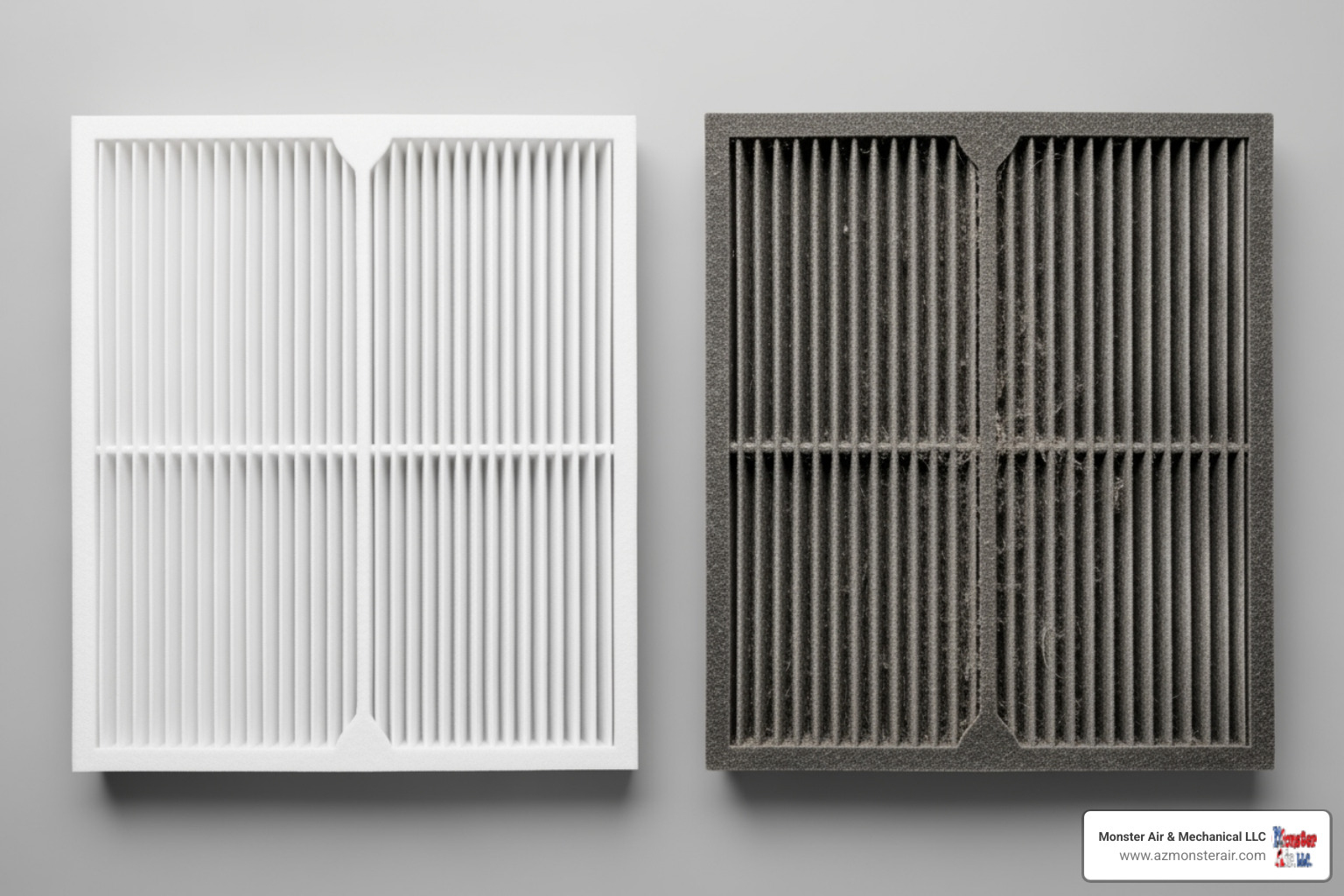

_11zon%20(1).webp)





